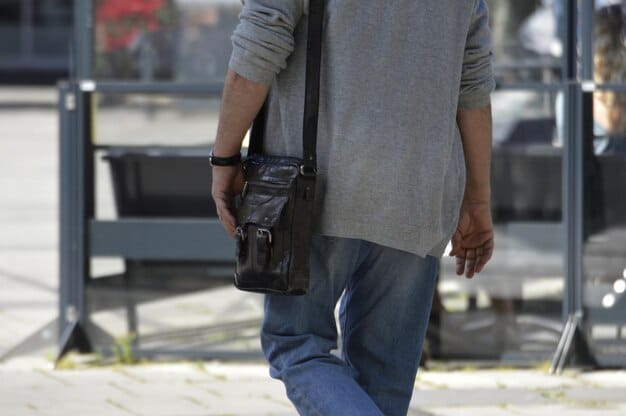How to Report a Travel Crime: A Step-by-Step Guide for US Citizens Abroad

This comprehensive guide provides US citizens traveling abroad with detailed steps on how to report a travel crime, including immediate actions, contacting the US embassy, and utilizing available resources.
Traveling abroad offers incredible experiences, but it’s essential to be prepared for unexpected events. This step-by-step guide, **How to Report a Travel Crime: A Step-by-Step Guide for US Citizens Abroad**, is designed to empower US citizens with the knowledge and resources they need to navigate the process effectively and safely.
Understanding the Importance of Reporting Travel Crimes
When a crime occurs during international travel, reporting it is crucial for several reasons. It not only aids in the investigation and potential prosecution of the perpetrators but also helps in securing necessary documentation for insurance claims and potential victim assistance programs. Furthermore, reporting contributes to a more accurate understanding of crime trends affecting US travelers abroad.
Failing to report a crime can lead to significant challenges, especially when dealing with insurance companies or attempting to seek restitution. The lack of an official record can hinder the process and make it difficult to prove the incident occurred.
Why Reporting Matters
Reporting a crime, regardless of its severity, establishes a documented record. This record serves multiple purposes, from facilitating insurance claims to supporting potential criminal investigations by local authorities and even the FBI in certain cases. It also contributes to broader data collection, helping to identify hotspots and trends in travel-related crimes.
- Insurance Claims: A police report is often a prerequisite for filing an insurance claim related to theft, loss, or injury.
- Victim Assistance: Reporting a crime can open avenues for victim assistance programs and resources.
- Criminal Investigation: Your report can provide valuable information that aids local authorities in their investigation.
Remember, the act of reporting itself can be a deterrent to future crimes. Increased awareness and vigilance prompted by crime reports can help create a safer environment for all travelers.

Immediate Steps to Take After a Crime
After experiencing a crime while traveling abroad, your immediate actions can significantly impact the outcome. Prioritizing your safety, preserving evidence, and promptly reporting the incident are essential steps. These actions can both protect you and aid in any subsequent investigations and claims.
Your immediate response sets the stage for further action, impacting everything from securing evidence to receiving the assistance you need.
Ensuring Your Safety
Your well-being is the top priority. Get yourself to a safe location away from immediate danger. If you’ve been physically harmed, seek medical attention immediately. Contact local emergency services if necessary.
- Seek Medical Attention: If you’ve been injured, call for medical assistance right away.
- Move to a Safe Location: Remove yourself from the immediate vicinity of the crime scene.
- Contact Emergency Services: Dial the local emergency number if you need immediate assistance.
It’s also wise to notify someone you trust about your situation, whether it’s a family member back home or a fellow traveler. Sharing your location and circumstances can provide an added layer of security.
Contacting the US Embassy or Consulate
Reaching out to the US embassy or consulate in the country where you are traveling is a critical step after reporting a crime to local authorities. The embassy can provide a range of assistance, from helping you navigate the local legal system to providing emergency financial aid if needed. However, it’s important to understand their limitations; they cannot act as law enforcement or provide legal representation.
Early contact with the US embassy ensures you receive essential support and guidance during a challenging time.
Types of Assistance Available
The US embassy or consulate can offer several types of assistance to US citizens who have been victims of crime abroad. This includes providing information on local legal and medical resources, assisting with contacting family members, and, in some cases, issuing emergency passports.
- Legal Referrals: The embassy can provide a list of local attorneys who can assist you.
- Medical Assistance: They can help you find local medical facilities and understand your insurance coverage.
- Emergency Passport: If your passport has been lost or stolen, the embassy can issue an emergency passport.
Keep in mind that the embassy cannot directly intervene in legal proceedings or provide financial assistance beyond emergency situations. They serve as a resource and point of contact, offering support within the bounds of their diplomatic role.

Filing a Police Report with Local Authorities
Filing a police report with the local authorities in the country where the crime occurred is a formal step that creates an official record of the incident. This report is essential for insurance claims, investigations, and potential legal proceedings. It’s crucial to provide accurate and detailed information to ensure the report is comprehensive and useful. Be sure to obtain a copy of the police report for your records.
A detailed police report is a cornerstone for any further actions you may need to take, both locally and in the US.
Key Information to Include
When filing a police report, provide as much detailed information as possible. Include the date, time, and location of the crime, a description of the perpetrators (if known), and a comprehensive account of what happened. If possible, provide any evidence, such as photos or videos, that may support your claim.
- Date, Time, and Location: Precisely note when and where the crime occurred.
- Description of Perpetrators: If you saw the perpetrators, provide a detailed description of their appearance.
- Account of Events: Give a clear and concise narrative of what happened.
If you don’t speak the local language, request an interpreter. Ensure that you understand everything in the report before signing it. Obtain a copy of the report for your records and note the report number for future reference.
Navigating the Local Legal System
Dealing with a foreign legal system can be daunting. Laws, procedures, and cultural norms can differ significantly from the US. Understanding these differences and seeking appropriate legal counsel is crucial if you need to navigate the local legal landscape. The US embassy can provide a list of attorneys who are familiar with local laws and can assist you.
Knowledge and proper guidance are key when engaging with a foreign legal system.
Finding Legal Assistance
The US embassy or consulate is your primary resource for finding legal assistance. They can provide a list of local attorneys who speak English and are experienced in handling cases involving foreigners. It’s important to interview potential attorneys to ensure they are a good fit for your needs.
Consider the attorney’s experience, qualifications, and fees when making your decision. Don’t hesitate to ask for references or testimonials from previous clients.
Utilizing Travel Insurance and Other Resources
Travel insurance can be a lifesaver when you encounter unexpected problems while traveling abroad, including being the victim of a crime. Review your policy carefully to understand what types of incidents are covered and what documentation you’ll need to file a claim. Other resources, such as victim assistance programs and mental health services, can also provide valuable support.
Being aware of available resources and your insurance coverage can significantly ease the burden during a difficult time.
Making an Insurance Claim
To make an insurance claim, you will typically need a copy of the police report, receipts for any stolen or damaged items, and documentation of any medical expenses. Contact your insurance provider as soon as possible after the incident to understand their specific requirements and deadlines.
- Keep Records: Maintain copies of all relevant documents, including receipts and medical records.
- Contact Your Insurer: Notify your insurance provider promptly to understand their claims process.
- Follow Up: Track the progress of your claim and respond promptly to any requests for additional information.
In addition to travel insurance, consider exploring victim assistance programs offered by non-profit organizations or government agencies. These programs can provide counseling, advocacy, and financial assistance.
Preventing Travel Crimes: Practical Tips
While it’s impossible to eliminate all risk, taking proactive steps to prevent travel crimes can significantly reduce your vulnerability. Staying informed about potential scams, securing your belongings, and being aware of your surroundings are all effective strategies. These preventative measures can help you enjoy a safer and more secure travel experience.
Prevention is always better than cure. A proactive approach can minimize your risk of becoming a victim of crime.
Staying Vigilant and Informed
Before you travel, research the crime rates and common scams in your destination. Be aware of your surroundings and avoid risky situations, such as walking alone in poorly lit areas at night. Secure your belongings and avoid displaying expensive jewelry or electronics.
- Research Your Destination: Understand potential risks and common scams.
- Be Aware of Your Surroundings: Pay attention to your environment and avoid risky situations.
- Secure Your Belongings: Keep your valuables hidden and be mindful of pickpockets.
Trust your instincts. If something feels off, remove yourself from the situation. It’s always better to err on the side of caution.
| Key Point | Brief Description |
|---|---|
| 🚨 Immediate Safety | Prioritize your safety; seek medical help if needed. |
| 🏛️ Embassy Contact | Notify the US Embassy for assistance. |
| 📝 Police Report | File a detailed police report for record. |
| 🛡️ Travel Insurance | Check your travel insurance for claims. |
[Frequently Asked Questions]
▼
First, ensure your safety. Move to a secure location and assess any injuries. Then, contact the local police to report the crime and get a copy of the police report.
▼
The embassy can provide a list of local attorneys, help you find medical assistance, and issue an emergency passport if yours is lost or stolen. They cannot provide legal representation.
▼
Yes, filing a police report is crucial regardless of the crime’s severity. It’s often required for insurance claims and can aid in investigations. It also helps to document crime trends.
▼
Include the date, time, and location of the crime, a description of the perpetrators (if known), and a detailed account of what happened. Provide any evidence you may have.
▼
Request an interpreter when filing a police report. Ensure you understand everything in the report before signing it, and obtain a copy for your records.
Conclusion
Being prepared and knowing how to respond to a crime while traveling abroad is essential for US citizens. By following these steps – prioritizing safety, contacting the US embassy, filing a police report, and utilizing available resources – you can navigate challenging situations with greater confidence and ensure your well-being.





